北京市七年级英语下册 Unit 12 What did you do last weekend Section B教案 (新版)人教新目标版
- 格式:doc
- 大小:71.03 KB
- 文档页数:3
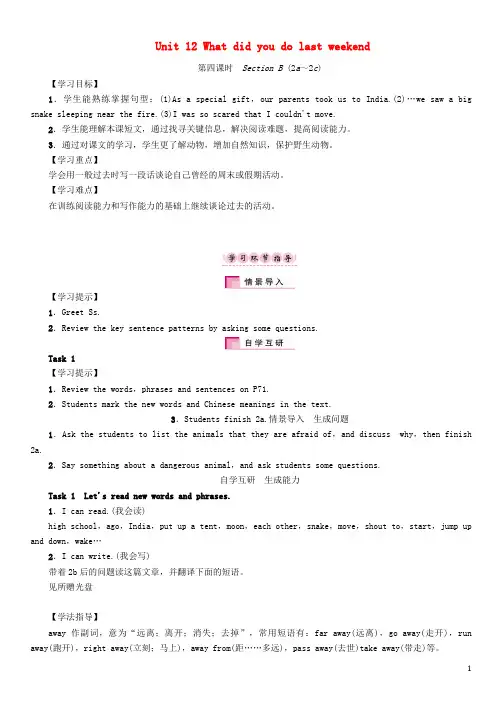
Unit 12 What did you do last weekend第四课时Section B (2a~2c)【学习目标】1.学生能熟练掌握句型:(1)As a special gift,our parents took us to India.(2)…we saw a big snake sleeping near the fire.(3)I was so scared that I couldn't move.2.学生能理解本课短文,通过找寻关键信息,解决阅读难题,提高阅读能力。
3.通过对课文的学习,学生更了解动物,增加自然知识,保护野生动物。
【学习重点】学会用一般过去时写一段话谈论自己曾经的周末或假期活动。
【学习难点】在训练阅读能力和写作能力的基础上继续谈论过去的活动。
【学习提示】1.Greet Ss.2.Review the key sentence patterns by asking some questions.Task 1【学习提示】1.Review the words,phrases and sentences on P71.2.Students mark the new words and Chinese meanings in the text.3.Students finish 2a.情景导入生成问题1.Ask the students to list the animals that they are afraid of,and discuss why,then finish 2a.2.Say something about a dangerous animal,and ask students some questions.自学互研生成能力Task 1Let's read new words and phrases.1.I can read.(我会读)high school,ago,India,put up a tent,moon,each other,snake,move,shout to,start,jump up and down,wake…2.I can write.(我会写)带着2b后的问题读这篇文章,并翻译下面的短语。
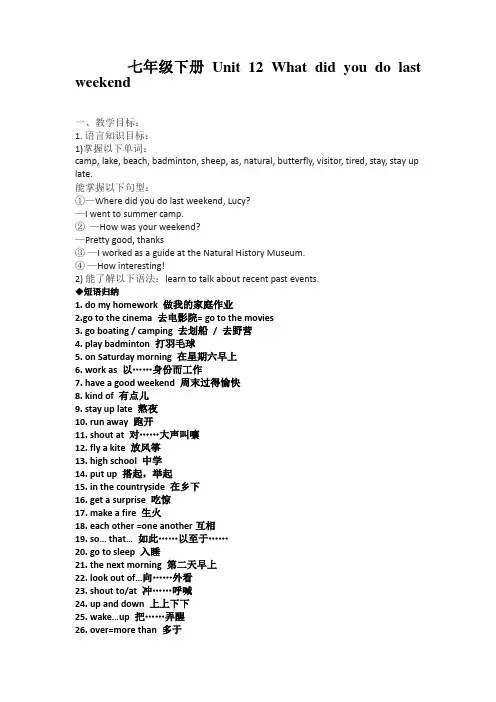
七年级下册Unit 12 What did you do last weekend一、教学目标:1. 语言知识目标:1)掌握以下单词:camp, lake, beach, badminton, sheep, as, natural, butterfly, visitor, tired, stay, stay up late.能掌握以下句型:①—Where did you do last weekend, Lucy?—I went to summer camp.②—How was your weekend?—Pretty good, thanks③—I worked as a guide at the Natural History Museum.④—How interesting!2) 能了解以下语法:learn to talk about recent past events.◆短语归纳1. do my homework 做我的家庭作业2.go to the cinema 去电影院= go to the movies3. go boating / camping 去划船/ 去野营4. play badminton 打羽毛球5. on Saturday morning 在星期六早上6. work as 以……身份而工作7. have a good weekend 周末过得愉快8. kind of 有点儿9. stay up late 熬夜10. run away 跑开11. shout at 对……大声叫嚷12. fly a kite 放风筝13. high school 中学14. put up 搭起,举起15. in the countryside 在乡下16. get a surprise 吃惊17. make a fire 生火18. each other =one another互相19. so… that…如此……以至于……20. go to sleep 入睡21. the next morning 第二天早上22. look out of…向……外看23. shout to/at 冲……呼喊24. up and down 上上下下25. wake…up 把……弄醒26. over=more than 多于27.By the lake在湖边28.. a swimming pool 一个游泳池29.study for a test.备考30.under the moon在月亮下31.in the sun.在阳光下32.tell stories讲故事33.get/be lost 迷路34.a second language 另一种语言35.visit sb.拜访某人36.feed sheep喂养37.learn from 从...中获得38.in danger 处于危险中◆用法集萃1. go + doing 去做某事2. play + 球类玩……球3. 时间段+ ago ……前4. keep + sb. / sth. + 形容词/ 副词/ 介词短语使……保持……5. so + 形容词/ 副词+ that 句子如此……以至于……6. see sb. doing sth. 看见某人正在做某事7. let sb. do sth. 让某人做某事8. start to do / doing sth. 开始做某事9.finish doing sth。
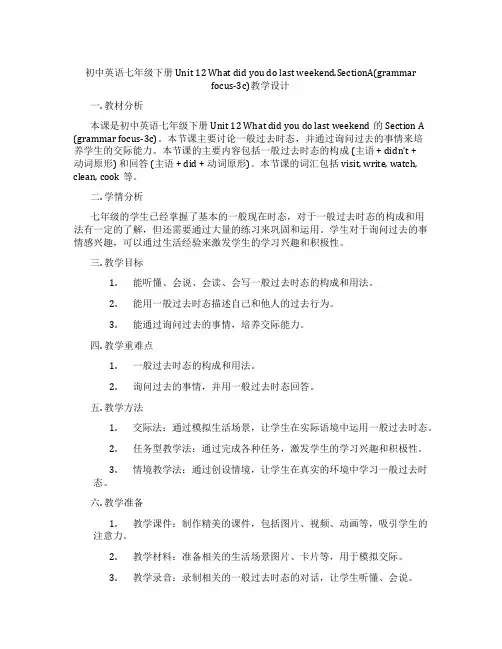
初中英语七年级下册 Unit 12 What did you do last weekend.SectionA(grammarfocus-3c)教学设计一. 教材分析本课是初中英语七年级下册Unit 12 What did you do last weekend的Section A (grammar focus-3c)。
本节课主要讨论一般过去时态,并通过询问过去的事情来培养学生的交际能力。
本节课的主要内容包括一般过去时态的构成 (主语+ didn’t +动词原形) 和回答 (主语 + did + 动词原形)。
本节课的词汇包括visit, write, watch, clean, cook等。
二. 学情分析七年级的学生已经掌握了基本的一般现在时态,对于一般过去时态的构成和用法有一定的了解,但还需要通过大量的练习来巩固和运用。
学生对于询问过去的事情感兴趣,可以通过生活经验来激发学生的学习兴趣和积极性。
三. 教学目标1.能听懂、会说、会读、会写一般过去时态的构成和用法。
2.能用一般过去时态描述自己和他人的过去行为。
3.能通过询问过去的事情,培养交际能力。
四. 教学重难点1.一般过去时态的构成和用法。
2.询问过去的事情,并用一般过去时态回答。
五. 教学方法1.交际法:通过模拟生活场景,让学生在实际语境中运用一般过去时态。
2.任务型教学法:通过完成各种任务,激发学生的学习兴趣和积极性。
3.情境教学法:通过创设情境,让学生在真实的环境中学习一般过去时态。
六. 教学准备1.教学课件:制作精美的课件,包括图片、视频、动画等,吸引学生的注意力。
2.教学材料:准备相关的生活场景图片、卡片等,用于模拟交际。
3.教学录音:录制相关的一般过去时态的对话,让学生听懂、会说。
七. 教学过程1.导入(5分钟)a.自由谈话:询问学生上周做了什么,引导学生用一般过去时态回答。
b.展示图片:展示一些与过去相关的图片,如上周的课堂活动、学生的家庭聚会等,激发学生的学习兴趣。
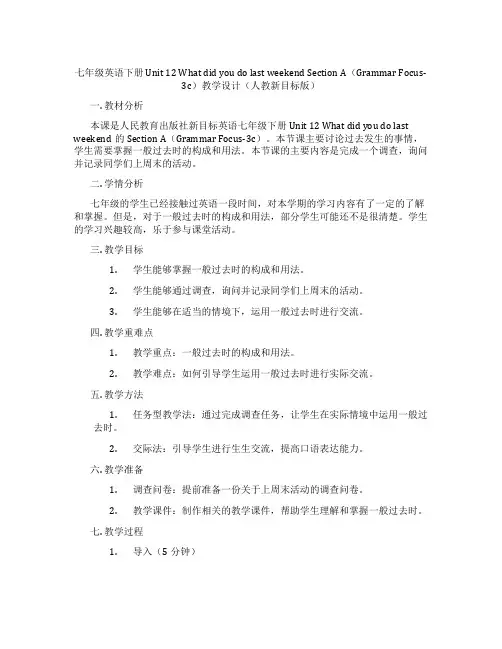
七年级英语下册 Unit 12 What did you do last weekend Section A(Grammar Focus-3c)教学设计(人教新目标版)一. 教材分析本课是人民教育出版社新目标英语七年级下册Unit 12 What did you do last weekend的Section A(Grammar Focus-3c)。
本节课主要讨论过去发生的事情,学生需要掌握一般过去时的构成和用法。
本节课的主要内容是完成一个调查,询问并记录同学们上周末的活动。
二. 学情分析七年级的学生已经接触过英语一段时间,对本学期的学习内容有了一定的了解和掌握。
但是,对于一般过去时的构成和用法,部分学生可能还不是很清楚。
学生的学习兴趣较高,乐于参与课堂活动。
三. 教学目标1.学生能够掌握一般过去时的构成和用法。
2.学生能够通过调查,询问并记录同学们上周末的活动。
3.学生能够在适当的情境下,运用一般过去时进行交流。
四. 教学重难点1.教学重点:一般过去时的构成和用法。
2.教学难点:如何引导学生运用一般过去时进行实际交流。
五. 教学方法1.任务型教学法:通过完成调查任务,让学生在实际情境中运用一般过去时。
2.交际法:引导学生进行生生交流,提高口语表达能力。
六. 教学准备1.调查问卷:提前准备一份关于上周末活动的调查问卷。
2.教学课件:制作相关的教学课件,帮助学生理解和掌握一般过去时。
七. 教学过程1.导入(5分钟)教师通过提问学生:“What did you do yesterday?”,引导学生回答并复习一般过去时的用法。
然后,告诉学生今天我们要学习如何询问别人上周末的活动。
2.呈现(10分钟)教师通过课件展示一般过去时的构成和用法,让学生初步感知和理解。
同时,教师可以举例说明一般过去时的用法,如:“I visited my grandparents last weekend.”。
3.操练(10分钟)教师学生进行小组活动,让学生相互询问并记录上周末的活动。
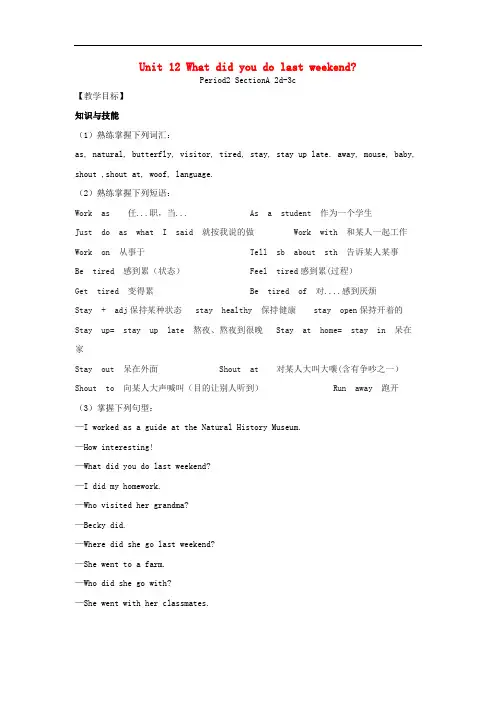
Unit 12 What did you do last weekend?Period2 SectionA 2d-3c【教学目标】知识与技能(1)熟练掌握下列词汇:as, natural, butterfly, visitor, tired, stay, stay up late. away, mouse, baby, shout ,shout at, woof, language.(2)熟练掌握下列短语:Work as 任...职,当... As a student 作为一个学生Just do as what I said 就按我说的做 Work with 和某人一起工作Work on 从事于 Tell sb about sth 告诉某人某事Be tired 感到累(状态) Feel tired感到累(过程)Get tired 变得累 Be tired of 对....感到厌烦Stay + adj保持某种状态 stay healthy 保持健康 stay open保持开着的Stay up= stay up late 熬夜、熬夜到很晚 Stay at home= stay in 呆在家Stay out 呆在外面 Shout at 对某人大叫大嚷(含有争吵之一)Shout to 向某人大声喊叫(目的让别人听到) Run away 跑开(3)掌握下列句型:—I worked as a guide at the Natural History Museum.—How interesting!—What did you do last weekend?—I did my homework.—Who visited her grandma?—Becky did.—Where did she go last weekend?—She went to a farm.—Who did she go with?—She went with her classmates.过程与方法Role-play, 朗读,语法总结与练习情感、态度与价值观1. 提高学生独立学习能力。
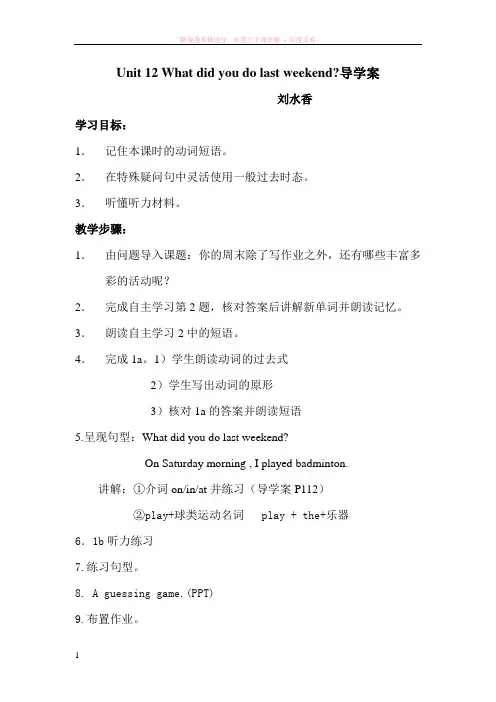
Unit 12 What did you do last weekend?导学案
刘水香
学习目标:
1.记住本课时的动词短语。
2.在特殊疑问句中灵活使用一般过去时态。
3.听懂听力材料。
教学步骤:
1.由问题导入课题:你的周末除了写作业之外,还有哪些丰富多彩的活动呢?
2.完成自主学习第2题,核对答案后讲解新单词并朗读记忆。
3.朗读自主学习2中的短语。
4.完成1a。
1)学生朗读动词的过去式
2)学生写出动词的原形
3)核对1a的答案并朗读短语
5.呈现句型:What did you do last weekend?
On Saturday morning , I played badminton.
讲解:①介词on/in/at并练习(导学案P112)
②play+球类运动名词 play + the+乐器
6.1b听力练习
7.练习句型。
8. A guessing game.(PPT)
9.布置作业。
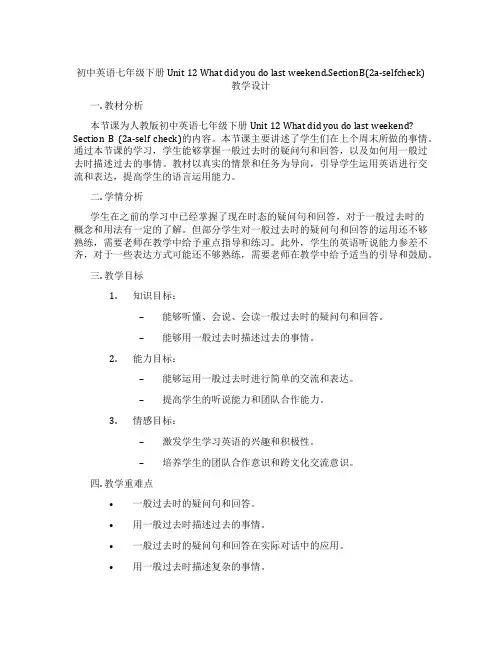
初中英语七年级下册 Unit 12 What did you do last weekend.SectionB(2a-selfcheck)教学设计一. 教材分析本节课为人教版初中英语七年级下册Unit 12 What did you do last weekend? Section B (2a-self check)的内容。
本节课主要讲述了学生们在上个周末所做的事情。
通过本节课的学习,学生能够掌握一般过去时的疑问句和回答,以及如何用一般过去时描述过去的事情。
教材以真实的情景和任务为导向,引导学生运用英语进行交流和表达,提高学生的语言运用能力。
二. 学情分析学生在之前的学习中已经掌握了现在时态的疑问句和回答,对于一般过去时的概念和用法有一定的了解。
但部分学生对一般过去时的疑问句和回答的运用还不够熟练,需要老师在教学中给予重点指导和练习。
此外,学生的英语听说能力参差不齐,对于一些表达方式可能还不够熟练,需要老师在教学中给予适当的引导和鼓励。
三. 教学目标1.知识目标:–能够听懂、会说、会读一般过去时的疑问句和回答。
–能够用一般过去时描述过去的事情。
2.能力目标:–能够运用一般过去时进行简单的交流和表达。
–提高学生的听说能力和团队合作能力。
3.情感目标:–激发学生学习英语的兴趣和积极性。
–培养学生的团队合作意识和跨文化交流意识。
四. 教学重难点•一般过去时的疑问句和回答。
•用一般过去时描述过去的事情。
•一般过去时的疑问句和回答在实际对话中的应用。
•用一般过去时描述复杂的事情。
五. 教学方法1.任务型教学法:通过设定各种真实的任务,让学生在完成任务的过程中运用英语进行交流和表达。
2.交际型教学法:通过模拟真实的情景,引导学生运用英语进行交际,提高学生的听说能力。
3.合作学习法:通过小组合作的形式,让学生共同完成任务,培养学生的团队合作意识。
六. 教学准备1.教师准备:–教材、课件、教学素材。
–录音机、耳机等音响设备。
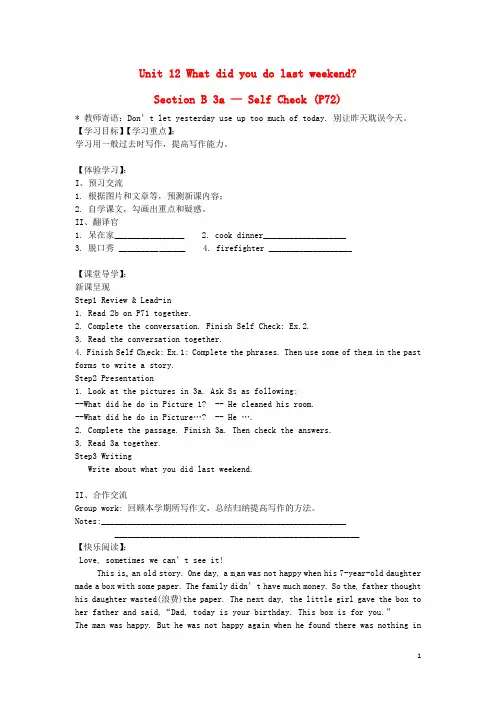
Unit 12 What did you do last weekend?Section B 3a — Self Check (P72)* 教师寄语:Don’t let yesterday use up too much of today. 别让昨天耽误今天。
【学习目标】【学习重点】:学习用一般过去时写作,提高写作能力。
【体验学习】:I、预习交流1. 根据图片和文章等,预测新课内容;2. 自学课文,勾画出重点和疑惑。
II、翻译官1. 呆在家________________2. cook dinner___________________3. 脱口秀 _______________4. firefighter ___________________【课堂导学】:新课呈现Step1 Review & Lead-in1. Read 2b on P71 together.2. Complete the conversation. Finish Self Check: Ex.2.3. Read the conversation together.4. Finish Self Ch eck: Ex.1: Complete the phrases. Then use some of the m in the past forms to write a story.Step2 Presentation1. Look at the pictures in 3a. Ask Ss as following:--What did he do in Picture 1? -- He cleaned his room.--What did he do in Picture…? -- He ….2. Complete the passage. Finish 3a. Then check the answers.3. Read 3a together.Step3 WritingWrite about what you did last weekend.II、合作交流Group work: 回顾本学期所写作文,总结归纳提高写作的方法。
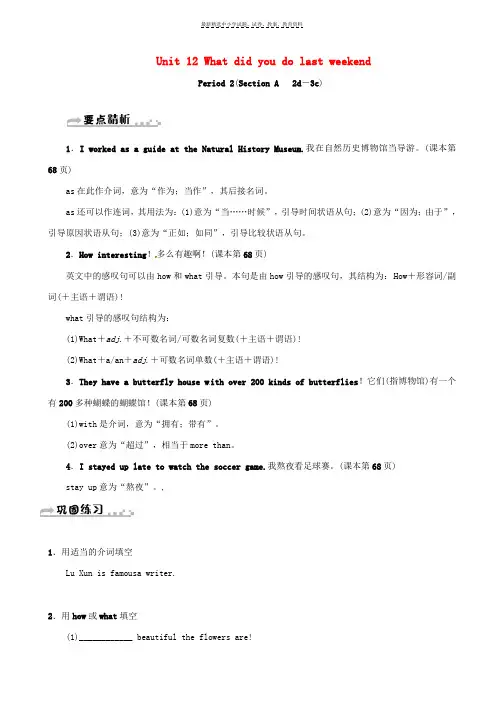
Unit 12 What did you do last weekendPeriod 2(Section A 2d-3c)1.I worked as a guide at the Natural History Museum.我在自然历史博物馆当导游。
(课本第68页)as在此作介词,意为“作为;当作”,其后接名词。
as还可以作连词,其用法为:(1)意为“当……时候”,引导时间状语从句;(2)意为“因为;由于”,引导原因状语从句;(3)意为“正如;如同”,引导比较状语从句。
2.How interesting!多么有趣啊!(课本第68页)英文中的感叹句可以由how和what引导。
本句是由how引导的感叹句,其结构为:How+形容词/副词(+主语+谓语)!what引导的感叹句结构为:(1)What+adj.+不可数名词/可数名词复数(+主语+谓语)!(2)What+a/an+adj.+可数名词单数(+主语+谓语)!3.They have a butterfly house w ith over 200 kinds of butterflies!它们(指博物馆)有一个有200多种蝴蝶的蝴蝶馆!(课本第68页)(1)with是介词,意为“拥有;带有”。
(2)over意为“超过”,相当于more than。
4.I stayed up late to watch the soccer game.我熬夜看足球赛。
(课本第68页)stay up意为“熬夜”。
,1.用适当的介词填空Lu Xun is famousa writer.2.用how或what填空(1)____________ beautiful the flowers are!(2)____________ delicious food it is!3-1.用适当的介词填空I often dream of a big housea nice garden.3-2.改为同义句Yo u may not keep it for over three weeks.You may not keep it forthree weeks.4.选词填空-Don't(dress up, grow up, stay up) late, Mary. You have a singing competition tomorrow morning.-OK, Dad. I'll go to bed right now.一、汉译英1.跑开____________2.当导游____________3.告诉某人有关某事____________4.自然历史博物馆____________5.生活习惯____________6.有一个愉快的周末____________7.有点儿累____________8.熬夜到很晚____________9.观看足球比赛____________10.一门外语____________11.冲着某人叫____________二、根据汉语提示完成句子1.Can you help me feed my cat when I'm ____________(离开)?2.Look! There are so many ____________(老鼠) in the old house.3.Please be quiet. The ____________(婴儿) is sleeping.4.Don't ____________(叫喊) at her.5.What ____________(语言) does Kelly speak?三、用所给单词的适当形式填空1.Last summer my family and I ____________(swim) in the sea.2.When it ____________(rain),I stayed at home and watched TV.3.They ____________(fly) a kite on the playground happily last weekend.4.Let the boy ____________(go) home, please.5.Yesterday they ____________(go) to the beach.6.Yesterday Ben __________ his homework. He often _________ his homework after school.(do) 7.I ____________(hear) a boy ____________(sing) in the room when I went downstairs. 8.Tom ____________(write) a new song th e day before yesterday.9.I _____(stay) up la te _______(do) my homework last night and ______(get) up late this morning. 10.He ____________(lose) his key and he ____________(can not) get into his home yesterday.四、阅读理解Dave was ten years old and was a very lazy boy. He had to go to school every day. He didn't like school and didn't want to do much work. His parents are doctors. They hoped that their son would become a doctor when he grew up. But one day Dave said to his mother,“When I finish school, I want to be a dustman(垃圾工人).”“A dustman?” his mother asked. She was very surprised(惊讶的). “That's not a pleasant job. Why do you want to be a dustman?”“Because I only have to work one day a week,” Dave answered.“One day a week?” his mother asked. “What do you mean?”“Well,” Dave answered, “I know that dustmen only come to our house and work on Wednesday, because I only see them on that day.”( )1.Dave did not do much work at school because ________.A.he was lazy B.he didn't like the teacherC.he was good at his lessons D.his parents would help him( )2.Dave knew that ________.A.his parents wanted him to be a doctorB.his father was one of the best doctorsC.his mother worked very hardD.his teachers were very good( )3.Dave wanted to be a dustman because he thought ________.A.it was the easiest workB.it was the most interesting workC.it was much better than to be a doctorD.the dustmen didn't have to work every day( )4.Dave's mother thought the dustman's job was ________.A.happy B.light C.not pleasant D.not busy ( )5.Which of the following is RIGHT?A.Dave was a student of a very big school.B.Dave's parents worked in the same hospital.C.Dave was the only son of the family.D.Dave didn't know how dustmen did their work.参考答案Period 2【巩固练习】1.As2.(1)How(2)What3-1.with3-2.more than4.stay up【课时训练】一、1.run away2.work as a guide3.tell sb. about sth.4.NaturalHistoryMuseum5.living habits6.have a good weekend7.a little ti red8.stay up late9.watch a soccer game10.a second language11.shout at sb.二、1.away2.mice3.baby4.shout 5.language三、1.swam2.rained3.flew4.go5.went6.did, does7.heard, singing8.wrote 9.stayed, to do, got10.lost, couldn't四、1-5.AADCD。
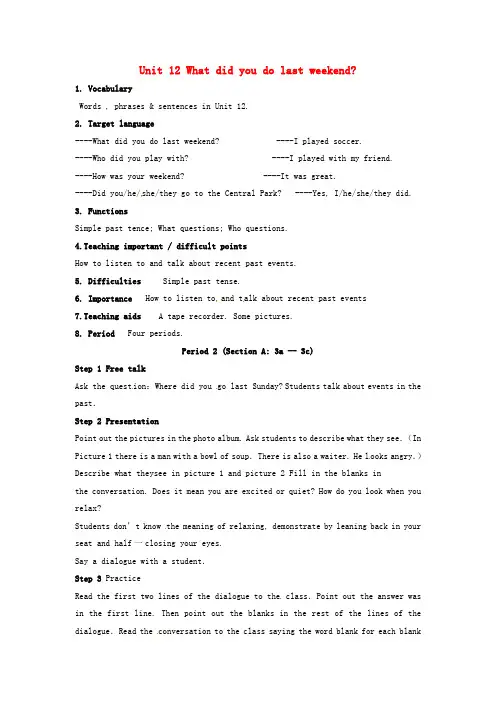
Unit 12 What did you do last weekend?1. VocabularyWords , phrases & sentences in Unit 12.2. Target language----What did you do last weekend? ----I played soccer.----Who did you play with? ----I played with my friend.----How was your weekend? ----It was great.----Did you/he/she/they go to the Central Park? ----Yes, I/he/she/they did.3. FunctionsSimple past tence; What questions; Who questions.4.Teaching important / difficult pointsHow to listen to and talk about recent past events.5. Difficulties Simple past tense.6. Importance How to listen to and t alk about recent past events7.Teaching aids A tape recorder. Some pictures.8. Period Four periods.Period 2 (Section A: 3a -- 3c)Step 1 Free talkAsk the quest ion:Where did you go last Sunday? Students talk about events in the past.Step 2 PresentationPoint out the pictures in the photo album. Ask students to describe what they see.(In Picture 1 there is a man with a bowl of soup.There is also a waiter. He l ooks angry.)Describe what theysee in picture 1 and picture 2 Fill in the blanks inthe conversation. Does it mean you are excited or quiet? How do you look when you relax?Students don’t know the meaning of relaxing, demonstrate by leaning back in your seat and half一closing your eyes.Say a dialogue with a student.Step 3 PracticeRead the first two lines of the dialogue to the class.Point out the answer was in the first line. Then point out the blanks in the rest of the lines of the dialogue.Read the conversation to the class saying the word blank for each blankline: How blank the beaches?Then say,Write the word was or were in each blank. Ask students to complete the activity on their own.Have two students perform the example conversation,or perform it yourself with one student(you ask the questions).Point out that the conversations starts off with the sentences in the speech bubbles.For example,A:where did you go?B: I went to…A: What was the weather like?B: It was hot and humid.How was the food? Do a send example,if you wish.Move around the room monitoring their work.Offer langua ge or pronunciation support as needed.Work with the teacher. Work with a partner and act out.Read and learn.Make their own conversationStep 4 PracticeSay:First fill in the chart with the information about your last vacation,Say where you went,what the weather was like, what you ate,and what else you did.As students fill in the chart move around the classroom, monitoring progress and offering help as necessary。
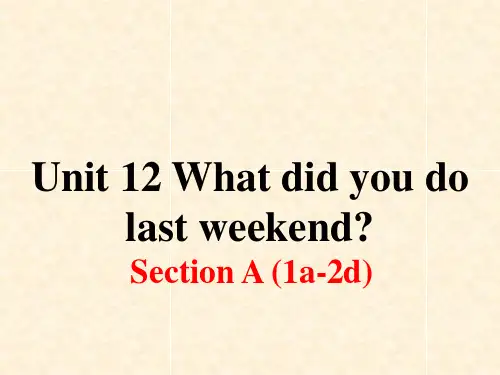
Unit12 What did you do last weekendKey wordsPast tenseSentences:–What did you do last weekend?–I played soccer.–Who went to the library?–Sally did.–Where did she go last weekend?–She went to a farm.– What did you do there?– We went to a lot of museums.Passage:Describe your last vacationUnit 12What did you do last weekend?Talk about past eventsGrammar:一般过去时(一般疑问句)重难点精讲单词camp, lake, beach, sheep, visitor, language, kite, surprise,snake, forest短语stay up late, run away, shout at, fly a kite, put up, get a surprise, shout to, up and down, wake…up, do homework, do some sports, study for a test, feed cows, go camping, go to the beach,put up a tent, make a fire, each other, have dinner with friends,swim in the river, last weekend重点词汇和短语测一测: 下面的短语你都能写出来吗?A: What did you do last weekend?B: I …...A: What about your friend, …?B: She / He …... What did you do?A: I …...It’s important to arrange a weekend reasonably and meaningfully.Everyone should learn how to make the most use of time.题一:I had a busy weekend. On Saturday morning, I . In the afternoon, I ____. It was a little difficult. On S aturday night, I stayed at home a nd __________cook dinner.On Sunday morning, I ________________. I read a book about history. Then in theafternoon, I ___________with my friends. On Sunday night, I .I saw an interesting talk show.题二:A Weekend to RememberMy sister finished high school two weeks ago. As a special gift, our parents took us to India.Last weekend was interesting but scary.We went camping in a small village in India. First, we took a long bus ride to a lake in thecountryside. There we put up our tents and made a fire to keep us warm and cook food on it. On thefirst night, we just sat under the moon and told each other stories. But I was so tired that I went to sleep early.The next morning, my sister and I got a terrible surprise. When we looked out of our tent, wesaw a big snake sleeping near th e fire. I was so scared that I couldn’t move. We shouted to ourpar ents to let them know about the danger. My dad started to jump up and down in their tent.This woke the snake up and it moved into the forest near the lake. My dad told me later thatsnak es don’t have ears but can feel things moving. He also told me it was important not to go near a snake. This was a very useful lesson for me.Why did parents take them to India?How was last weekend?What did they do in the small village?Why did they make a fire?Why did they get a surprise?How do they feel?How can snakes hear things?What do they learn from the experience?题三:Where ______ your parents a moment ago?A. wasB. wereC. isD. are--When ____ you ____ the bike?-- Last month.A. have; boughtB. had; boughtC. do; buyD. did; buy题四:His family ________ the zoo last week.A. visitB. are visitingC. visitedD. will visit--It’s dangerous to swim here. Look at the sign.-- Sorry, I ________notice it.A. haven’tB. won’tC. didn’tD. don’t题五:能力提升与拓展Kevin is from England. He 1 in London. He likes 2 to different places.L ast weekend, he 3 to Chongqing on vacation 4 his wife and son. On Sunday afternoon, 5was rainy. So they visited a museum. The museum w as too crowded. Their 6 was lost. They were very worried. But at last many Chinese people helped them 7 their son. They were very 8 .So when his friends ask Kevin, “ What do you 9 China?” He always 10 , “ I love it.”1. A. to live B. lives C. live D. lived2. A. go B. goes C. went D. to go3. A. came B. comes C. arrived D. arrives4. A. and B. or C. with D. of5. A. it B. she C. he D. they6. A. daughter B. son C. brother D. wife7. A. find B. finding C. look for D. looking for8. A. boring B. interesting C. happy D. sad9. A. like B. think C. think of D. look like10. A. spoke B. speaks C. said D. saysUnit12 What did you do last weekend题一:cleaned my room; did my homework; helped my mom; read a lot; played football; watched TV题二:Because their daughter finished high school, and they want to send her a gift.It was interesting but scary.They went camping.To keep us warm and cook food on it.They saw a big snake sleeping neat the fire.They felt a terrible surprise.They can feel things moving.Don’t go near a snake.题三:BD题四:CC题五:BDACABACCD。
Unit 12 What did you do last weekend Section B(1a-2c)一、教学目标:1. 语言知识目标:1) 能掌握以下单词: fly, kite, fly a kite.2) 能掌握以下句型:—Did you go anything interesting last weekend?—Not really, but I visited my sister.—My sister finished high school two weeks ago.2. 情感态度价值观目标:帮助学生对动物惧怕心理,鼓励学生学习自然知识。
教育学生合理安排作息时间,健康生活。
二、教学重难点1) Key vocabulary, 一般过去时态一般疑问句练习。
2) Talk about recent past events2. 教学难点:Talk about recent past eventsPractice students’ listening, speaking, reading and writing skills.三、教学过程Ⅰ. Warming- up and revision1. Greet students2. Show students new words in page 70, write on the blackboard. Make the students read.Ⅱ. PresentationWork on 1a.Call attention to the pictures. Ask students to point to and use the pas t tense to describe as many of the activities as possible. Point to and describe any activities they can't describe.For example, I played the guitar.Point to the numbered activities described in the list. Name the activities and ask students to repeat each one,After that, ask students to match each numbered phrase with a picture by writing the letter of each picture in the blank in front of the correct phrase. As students work, mo ve around theroom answering questions as needed.Check the answers:1d ,2 c ,3 f ,4 e ,5a ,6 b.Ⅲ. ThinkingWork on 1b:This activity provides reading practice using the target language.Draw pictures of the happy face and unhappy face on the board. Write the words fun under the happy face and the words not fun under the u nhappy face.Ask students to name some activities they think are fun and some that are not fun. For example,a student might say studying for a test is not fun.Point out the happy face under the pictures in la.Say, He sang an d played the guitar. It was fun. The happy face shows it was fun. Say, drawa happy face or an unhappy face for letters a, c, and a,Review the answers. Students may have different answ ers for some items- For example, went to the library may be fan for some students and not fun for others.Ⅳ. Listening 1cThis activity provides listening and writing practice using the target language.Call attention to the names Jim and Sally and the write-on lines under each name.Say, Now you are going to hear a conversation between Jim and Sally. They are talking about what they did over the weekend. Listen to the conversation and write what each person did.Play the recording the first time. Students only listen.Point out the sample answer, did her homework.Play the recording again. Ss listen and check their answers.Remind students that they can look back at earlier activities in this unit to get spelling help, if they wish.Ⅴ. PairworkWork on 1d:This activity provides guided oral practice using the target language.Call attention to the example in speech bubbles. Ask a pair of students to read the dialogue to the class.Say, Now practice talking about what Jim and Sally did over the weekend. Practice in pairs- Use the dialogue as an example.Help students find partners. Then say. First read the dialogue together. Read both parts. Then make your own dialogues like that one. Tell what Sally and Jim did over the weekend.As students practice, move around the room monitoring progress.Ask pairs of students to present their dialogues to the class.Ⅵ. PairworkWork on 1e:T his activity provides open-ended oral practice using the target language.Point out the example in speech bubbles. Ask two students to read the dialogue to the class.With a student, say a conversation about what you did over the weekend. You may wish to write two or three activities on the board for students to use in their conversations.Help students find partners. As they practice their conversations, move around the room monitoring progress and giving language support as needed.Ask some pairs to present their real-life conversations to the class.Ⅶ. ThinkingWork on 2a:This activity provides writing and oral practice using the target language. Show some photos of animals on the screen. Ask the class to answer the questions1.what kind of animal are you afraid of ?2.Why?3.Make a list. Ask students to say the words by themselves.Ⅷ. ReadingWork on 2b:This activity provides reading practice using the target language.1. Fast readingRead the article and find the answer to this question:What did they see near the fire the next morning?(They saw a snake sleeping near the fire)Ss read the article quickly and find the answers to this question. Then check the answers with the class.2. Careful readingRead the article and find the answ ers to the questions on 71.Ss read the passage and find the answers to the questions.Check the answers.Ⅸ. ReadingWork on 2cRead the instructions again, put the phrases in order according to the passage then use then to retell the story.1. Ask the student to read the story in 2b again, put the sentences in order.2. 阅读指导:(见课件部分)3. Check the answer.Answer: 6 2 8 4 7 5 1 33. Ask the students retell the story using the phrases.Homework1. Review the article in 2b.2. Ask Ss. Write down your own last weekend.板书设计:。
Unit 12 What did you do last weekendSection B 第4课时(2a〜3b)自主学习方案1.自学生词,并记住拼读及拼写。
2.预习课本找出重点短语及句子。
(见学案自学导练内容)3.读记后完成自学导练内容。
课堂导学方案Step1 情景导入Teacher :Are you afraid of the snakes?Do you know how to make the snake go away when you meet a snake?If you want to know the way,please learn this lesson with me together.环节说明:以动物为话题开始本节课,在发表自己的观点的同时完成了2a的学习任务,关于蛇的话题又激起了学生的学习兴趣。
为后面的学习打下了良好的基础。
Step 2完成教材2b-2c的任务1.快速阅读2b短文,了解短文大意。
(2分钟)2.认真阅读短文,根据短文内容完成练习。
集体核对答案。
(2分钟)3.再仔细阅读一遍短文,把2c的句子按正确顺序排列,核对答案。
(3分钟)4.大声朗读2c中排列好的句子,然后让几个学生来复述课文内容。
(5分钟)5.小结训练。
(2分钟)(1)The man was C old that he couldn’t walk any more.A veryB quiteC soD too(2)I saw him B basketball when I walked through the park.A playB playingC playsD played环节说明:本环节的学习,首先让学生对蛇的习性有了一定的了解,同时也使学生对一些重点短语和句型的用法有了更深刻的理解。
Step 3 完成教材3a—3b的任务1.请同学们认真阅读短文,根据图片提供的信息来完成短文填空。
完成后集体核对答案,同时要熟读短文。
Unit 12 What did you do last weekend Section B(3a-Self Check)
一、教学目标:
1. 语言知识目标:
1)复习一般过去时态的用法及动词的过去式。
能正确叙述过去发生的事情。
2)通过不同形式的练习题来练习谈论过去发生的事件。
3)学会谈论自己节假日的活动。
2. 情感态度价值观目标:
1) 能积极主动学习,合作学习。
2)温故知新,养成复习总结习惯。
二、教学重难点
1. 教学重点:1)复习一般过去时态的用法及动词的过去式。
2)通过不同形式的练习来熟练运用所学的知识。
2. 教学难点:
正确判断时态,能对一般过去时态熟练运用,描述过去的事件。
三、教学过程
Ⅰ. Warming- up and revision
1. Daily greeting.
2. Retell the article in 2b.
3. Review the vocabulary in this unit.
Ⅱ. Presentation
Show the picture in 3a, what can you see ? Ask the students to practice in pairs.
Ⅲ. Practice
This activity provides reading and writing practice using the target language.
Point out the pictures and ask students to describe what they see.
Answer any question. students may have about these or other vocabulary items. Write each new word on the board and discuss its meaning.
Answer: did my homework, helped my mother, went to the library, played soccer, watched TV. Ⅳ. Self Check1
1. Review the phrases in this unit, complete the phrases in self check 1.Ask students do the
e xercise by themselves, then check the answer.
Answer:
go out with friends fly a kite
go for a walk milk a cow
pick apples camp near the lake
take photos study for a test
2. Use the phrases to make some sentences in recent past events.
Ⅴ. Self Check 2
This activity provides reading and writing practice using the target langu age.
1. Make the students complete the conversation. Move around the room monitoring progress and
giving language support as needed.
2. Check the answer.
Answer : Where did you go?
Who did you go with?
What did you do?
Did you learn anything?
2. Ask two st udents to p erform the dialogue to the class.
Homework
1. Review Section B.
2. Now write a travel diary .Imagine you are an American student on vacation in Beijing. Have
students do the activity individually. Write on pieces of paper. Set it as written homework to be collected and marked.
板书设计:
Section B 3a-Self Check go out with friends fly a kite
go for a walk milk a cow
pick apples camp near the lake take photos study for a test
Where did you go?
Whom did you go with?
What did you do?
Did you learn anything?。